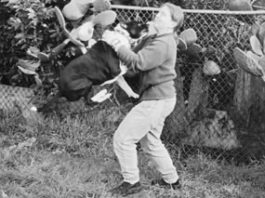Reducing Your Dog’s Anxieties
President Franklin D. Roosevelt, speaking about the Great Depression, said, We have nothing to fear but fear itself." If only it were that simple when dealing with dog behavior! Fear-related behaviors can be debilitating to the inappropriately fearful dog. They are heartbreaking
Dogs With An Unhealthy Fear of Storms and Loud Noises
Many behaviorists and dog trainers believe that puppies go through a so-called fear imprinting" period sometime between the ages of eight to 20 weeks
5 Things to Know About A Dog’s Threshold
has tuned out his owner
Ways to Combat Your Dog’s Indoor Urine-Marking
I can still remember the day, more than a decade ago, when I first realized with horror that our Scottish Terrier, Dubhy (pronounced Duffy")
How a Mother’s Stress Can Influence Unborn Puppies
Can a highly stressful environment during pregnancy affect how puppies turn out? Imagine this: A young dog goes stray and lives on urban streets for two months, in almost constant fear. Kids chase her down a street, throwing rocks at her; she is attacked by another dog; and she struggles every day to scavenge enough to eat. At last she is apprehended by an animal control officer and brought to a shelter. Here she finally gets enough to eat, but she's still not able to relax; the shelter is full of strange smells and loud noises, her run is small, and the floor is hard. After she's been at the shelter for a few weeks, a shelter staff member realizes that she is pregnant and due very soon. The shelter puts her on the waiting list for a foster home, knowing that puppies don't do well when they grow up in shelters.
Trying To Ease Your Dog’s Stress
Stress. Everyone knows what it feels like. Tight shoulders. Headache. Insomnia. Upset stomach. Everyone knows what can trigger it. Rush hour traffic. Deadlines. An insensitive boss. A toddler having a day of tantrums, unexpected bills, or taxes. We also know that too much stress can actually make us ill. Ulcers and high blood pressure are prime examples. A recent study noted that 19 percent of employees who call in sick on any particular day do so because they simply felt they needed a day off.
Dealing With Submissive Urination
Submissive urination is a vexing challenge with some puppies and young dogs. Most grow out of it eventually, but in the meantime, how can you help your pup put a cork in it? In the canine world, when one dog wants to show deference to another, more dominant dog, he may urinate as a sign of submission. The more threatened he feels, the more likely he is to urinate. This is an involuntary reaction, an instinctive behavior that all dogs are born “knowing” how and when to exhibit. In a pack of dogs, this programmed behavior is a valuable survival mechanism. Puppies are extremely vulnerable to the wrath of adult dogs in the pack, and built-in submissive responses signal normal adult dogs to automatically shut off the aggression, thus keeping puppies from being hurt.
When Your Dog Hates Being Touched
not training. Proceed more slowly
Living with a Difficult Dog
By your own standards, your dog’s life may not seem all that stressful – after all, he doesn’t have bills to pay, does he? But when you apply the more scientific definition of the word – anything that alarms or excites him, triggering his sympathetic nervous system into action and flooding him with the “fight or flight” chemicals adrenaline and noradrenaline – you may be able to see how many seemingly unrelated things in his environment actually contribute to his “misbehavior.”
Comfort Your Dog
There is absolutely no evidence, not one bit, suggesting that providing comfort and security to a distressed dog causes the dogs anxiety or fear to increase. Why then, does this myth persist among dog owners and even with some trainers? Why are owners still advised to ignore their dog when he is distressed or anxious or fearful, as if providing any attention to the dog will reinforce those emotions?
Is Your Dog Afraid of Thunder?
Everyone knows a thunderstorm horror story. A terrified dog leaps off a balcony or breaks through a plate glass window before jumping a fence, running into traffic, and meeting an unhappy fate. Or the animal simply disappears and is never seen again. More common and just as distressing are the panic attacks that overcome stay-at-home dogs when thunder roars or the neighbors light firecrackers. Conventional veterinary medicine treats thunderstorm and other noise phobias with powerful tranquilizers or psychoactive drugs, none of which cure the patient and all of which have adverse side effects.
Is My Dog Depressed?
When a dog is suddenly no longer interested in their favorite activities, whether it's playing Frisbee in the park or chasing squirrels in the backyard, most animal behavior experts will tell you to look for a physical explanation, not a mental-health recommendation. Taking your four-legged friend to the vet for a physical exam should always be the first response to what seems like depression. A change in behavior can usually be attributed to underlying physical conditions like arthritis or pain.
















